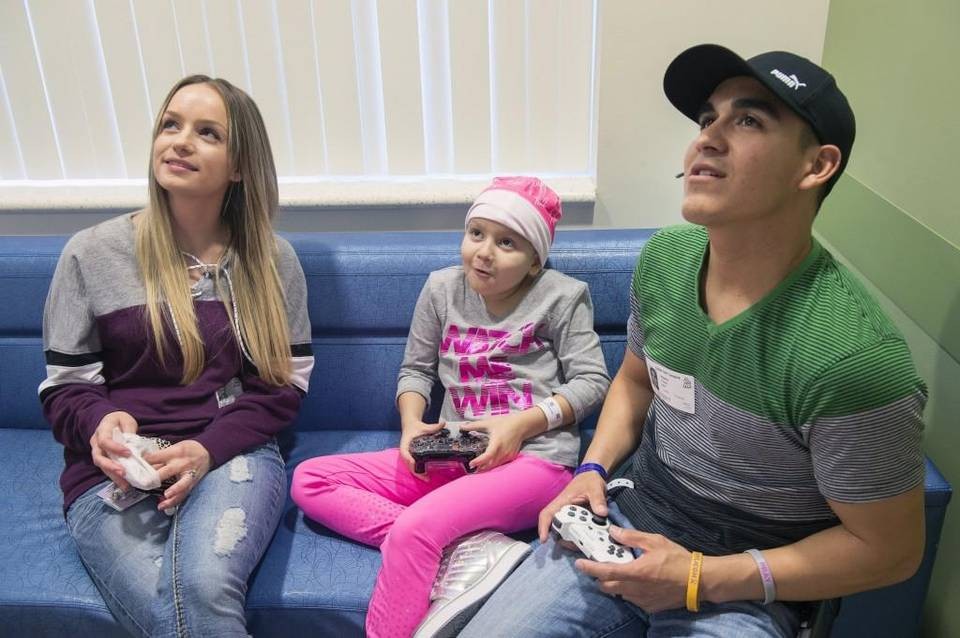The Kansas City Star: 8-year-old’s ovarian tissue frozen and stored for the future
Jhayliegh became the youngest person in the Kansas City area to undergo this type of procedure

At 8 years old and with leukemia, Jhayliegh Rosales is years away from thinking about having her first baby.
When the ebullient second-grader checked into Children’s Mercy recently in preparation for a bone marrow transplant, she’d placed a pink cap over where her brown hair used to be. In brave declaration of her future, she wore a T-shirt printed with “WATCH ME WIN” as she rolled through the hospital’s halls, balancing inside a new pair of silver high-top sneakers embedded with wheels like roller skates.
“She just got those,” said her father, Daniel Rosales, 28, a milk delivery truck driver from Ulysses, Kan. “They ought to keep her busy.”
Rosales and Jhayliegh’s mother, Alyssa Lopez, 27, of Garden City, Kan., had to do some significant balancing of their own regarding Jhayliegh’s future … as a mother.
In late December, Jhayliegh became the youngest person in the Kansas City area to undergo a procedure, still considered experimental, in which ovarian tissue was surgically removed and frozen in the event that 15 or more years from now she may want to have biological children of her own.
Lopez, Jhayliegh’s mom, said she first heard of the possibility of cryopreserving her daughter’s ovarian tissue from her oncologist at Children’s Mercy, physician Joy Fulbright. KU Health System and Children’s Mercy were working in cooperation. Lopez said knowing that her ill daughter might one day have the ability to have her own biological children infused a long and difficult journey with a current of hope.
“You don’t typically think of your 8-year-old having kids because it is so far off in the future,” said Lopez, who, with her husband, Pablo Lopez, raises both Jhayliegh and their 4-year-old daughter, Aziyah. “But when you’re going through this, you have to think of the future.
“I know if she wants to have kids of her own, this will give her an option.”
Rosales said in the hospital, “Every bit of hope. That’s what we want for her.”
Jhayliegh was 5 years old when, in October 2013, she was diagnosed with lymphoblastic leukemia, a type of blood cancer. “She had always been healthy,” her mother said. “One night, she was just telling me her right side was hurting. It was kind of on and off throughout the day. But then around 7 p.m. I took her to the emergency room.”
Lopez, who had been employed in a lab drawing blood, had thought her daughter might have appendicitis. A fever was spiking near 104 degree. Soon after her lab tests came back, the doctor said Jhayliegh needed more blood work and immediately put her in an ambulance to see a specialist at a hospital in Wichita, more than three hours away.
The doctor had mentioned the possibility of cancer.
“The whole way there I was praying it was a mistake,” Lopez said.
It wasn’t. Jhayliegh had acute lymphoblastic leukemia with a genetic anomaly that would complicate her treatments. For the next two years and eight months, she endured rounds of chemotherapy that sapped her energy and took her hair. “It was in June that she was supposed to have gotten her last treatment,” Lopez said, referring to last year.
Attuned to her daughter’s body and the signs of leukemia, Lopez soon began to notice some telltale bruising.
“She relapsed in November,” Lopez said.
Soon after, the physicians at Children’s Mercy told the family that Jhayliegh would need a bone marrow transplant. But this time, the more intensive chemotherapy and radiation would likely destroy the egg-producing follicles in her ovaries and her ability to one day become pregnant.
Children’s Mercy obstetrician and gynecologist Julie Strickland surgically removed the ovarian tissue in late December. Because the procedure is still considered experimental, insurance does not cover its cost, estimated at about $3,000 just for the cost of freezing alone, plus monthly storage fees for freezing. Jhayliegh’s bone marrow transplant is scheduled for this week.
 “While immediately, in a child, surviving their disease is the most important priority,” Strickland said, “many families experience great angst about the possibility that, if their child survives, that they would not be able to go on and have children of their own.
“While immediately, in a child, surviving their disease is the most important priority,” Strickland said, “many families experience great angst about the possibility that, if their child survives, that they would not be able to go on and have children of their own.
“So the reason we’re doing this now is that we do have hope that children will survive their cancers … and we know from our survivors that this (fertility) is a very important aspect as they become adults.”
Said Marsh of Jhayliegh: “The beautiful thing is that this was her only chance. ... She had a lot of intense cancer treatment coming up. She will likely have no ovarian function at all. We’re thinking of this as a medical treatment, giving her a quality of life.”
That’s what Jhayliegh’s mom and dad are hoping for.
“When you’re going through something like this, you have to have faith,” Lopez said. “I do believe everything is going to end well. It is good to hear about them talking about her future.”
See the full story via The Kansas City Star.
Learn more about The Children's Mercy Cancer Center.
Learn more about The Section of Bone Marrow Transplantation at Children's Mercy.
